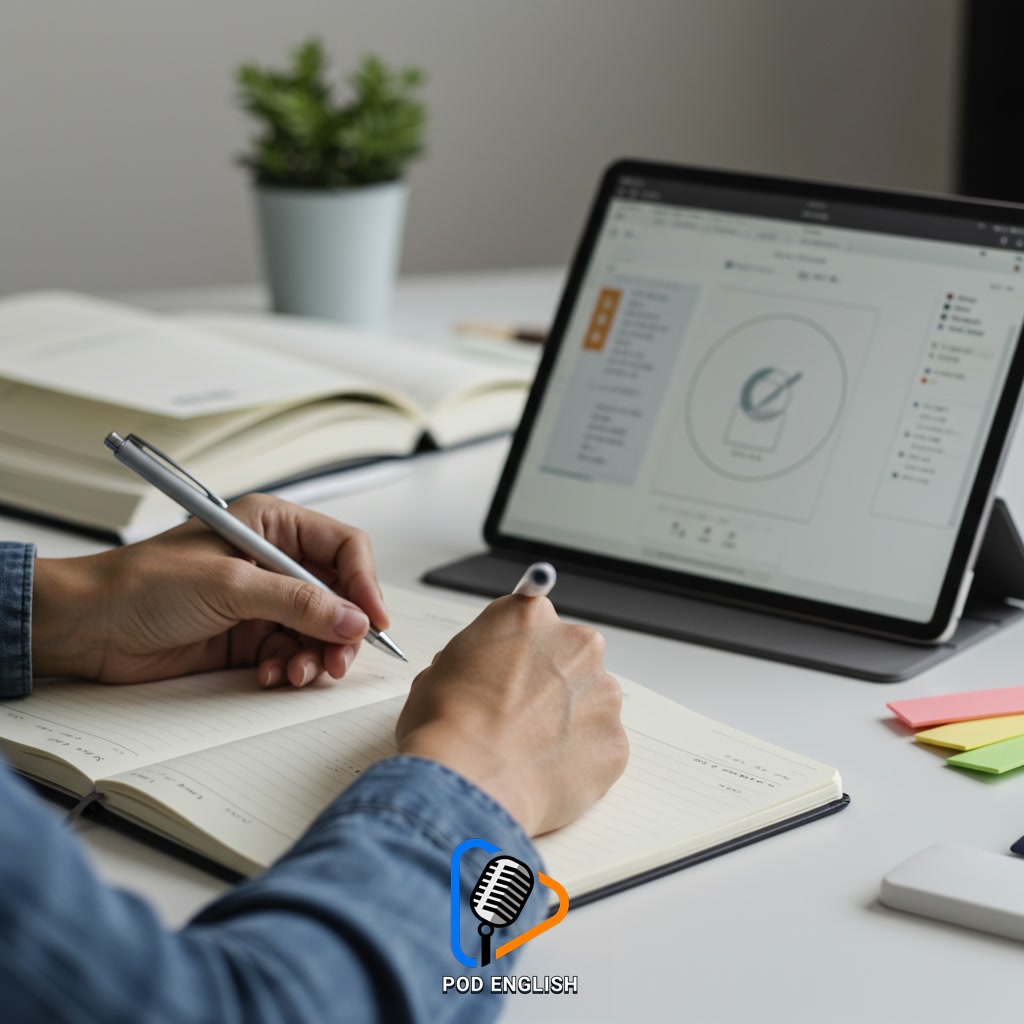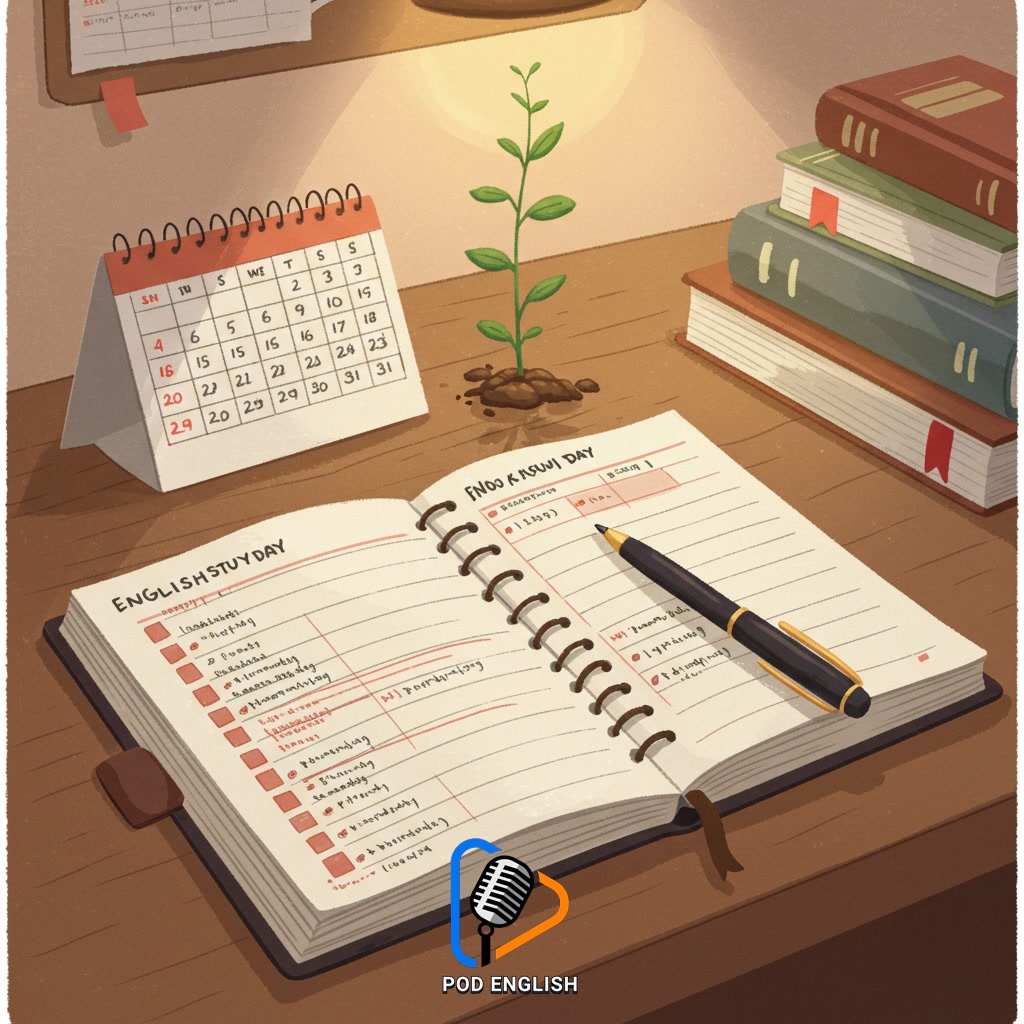Learn English
Daily Reflections: A Simple Way to Track Your English Study Progress

Daily reflections provide a simple method for tracking your advancements as you study English. Taking a moment each day to consider your learning activities helps identify progress and areas for improvement. This consistent habit supports motivation and offers a clear view of your English language development.
Table of Contents
- Section 1: Introduction: Why Tracking Progress is Crucial for English Learners
- Section 2: Understanding Daily Reflection in the Context of Language Study
- Section 3: Key Benefits of Daily Reflection for Tracking English Progress
- Section 4: Simple Steps to Start Your Daily English Study Reflection
- Section 5: Tools and Techniques for Effective Daily Reflection
- Section 6: Turning Insights from Reflection into Action for Improvement
- Section 7: Making Daily Reflection a Sustainable Habit for Long-Term Success
Section 1: Introduction: Why Tracking Progress is Crucial for English Learners
Beginning your English learning journey is exciting, but it can sometimes feel overwhelming. You might wonder if you are truly making progress, or if the time you spend studying is effective. This is why tracking your progress is not just helpful, but absolutely crucial for any English learner. Without a clear picture of where you started, what you have learned, and how far you have come, it’s easy to lose motivation or feel stuck. Tracking allows you to see concrete evidence of your improvement, no matter how small, which boosts confidence and keeps you inspired. It also helps you identify which study methods work best for you and where you might need to focus more effort. Think of it like following a map: you need to know where you are to figure out the best way to reach your destination.
Introduction: Why Tracking Progress is Crucial for English Learners
Section 2: Understanding Daily Reflection in the Context of Language Study
Following the initial excitement and potential overwhelm of starting your English learning journey, it’s crucial to establish methods that help you see your progress clearly. This is where daily reflection comes in. Understanding daily reflection in this context means dedicating a short amount of time each day to consciously think about your English study activities. It’s not just about reviewing vocabulary or grammar; it’s about observing *how* you learned, *what* you found challenging, *what* felt easy, and *how* you felt during the process. By engaging in this practice, you move from simply doing tasks to actively processing your learning experience, gaining valuable insights into your strengths, weaknesses, and the effectiveness of your study methods. This intentional pause helps solidify learning and makes your path forward much clearer.

Understanding Daily Reflection in the Context of Language Study
Section 3: Key Benefits of Daily Reflection for Tracking English Progress
Daily reflection offers several significant advantages for monitoring your English learning journey. Firstly, it provides concrete evidence of your progress, helping you see how far you’ve come and countering feelings of stagnation. This regular review also allows you to pinpoint specific areas where you might be struggling or need more focus, enabling you to adjust your study plan effectively. Furthermore, consistently reflecting reinforces your commitment and helps maintain motivation by highlighting achievements, no matter how small. By integrating this simple habit into your routine, you gain a clearer perspective on your development, making your study efforts more targeted and rewarding over time.
Key Benefits of Daily Reflection for Tracking English Progress
Section 4: Simple Steps to Start Your Daily English Study Reflection
Getting started with daily reflection on your English study is a simple process that builds on the benefits we’ve discussed. To begin, choose a consistent time each day, perhaps at the end of your study session or before bed, when you can dedicate just a few minutes. Next, decide on your method: a physical notebook and pen, a digital document on your computer, or a simple note-taking app on your phone. The key is to have a dedicated space for your reflections. Then, ask yourself a few basic questions: What did I study today? What was challenging? What did I understand well or feel proud of? What is one small thing I can focus on tomorrow? Keep your initial reflections short and focused. The goal is consistency, not length. This routine helps you track your progress and stay motivated by acknowledging your efforts.

Simple Steps to Start Your Daily English Study Reflection
Section 5: Tools and Techniques for Effective Daily Reflection
Once you’ve established a consistent time for reflection as suggested previously, the next step is choosing the right tools and techniques to make the process effective and sustainable. The simplest tools are often the best; a physical notebook and pen allow for freeform writing and can feel more personal. Alternatively, digital options like note-taking apps on your phone or computer, or even a simple document or spreadsheet, provide flexibility and searchability. Regardless of the tool, effective techniques involve asking yourself specific questions: What did I study today? What specific new words, phrases, or grammar points did I learn? What was challenging, and how did I handle it? What went well? What will I focus on tomorrow? Keeping your reflections brief and focused, perhaps using bullet points or short paragraphs, helps ensure consistency and makes the habit easy to maintain.

Tools and Techniques for Effective Daily Reflection
Section 6: Turning Insights from Reflection into Action for Improvement
After reflecting and identifying specific areas needing attention, the crucial next step is translating those insights into actionable plans. Simply knowing you struggle with a particular grammar point or vocabulary topic isn’t enough; you need to decide *how* you will address it. This might involve adjusting your study schedule to dedicate more time to that area, seeking out specific exercises or resources, or trying a different learning technique altogether. For instance, if your reflection reveals difficulty with listening comprehension, your action might be to add daily podcast listening or practice transcribing short audio clips. Regularly reviewing your reflection notes helps you pinpoint these areas and create targeted strategies, ensuring your study remains focused and effective, leading to tangible progress over time.

Turning Insights from Reflection into Action for Improvement
Section 7: Making Daily Reflection a Sustainable Habit for Long-Term Success
Building daily reflection into a sustainable habit is key to unlocking its long-term benefits for your English study. Rather than seeing it as a chore, integrate it seamlessly into your routine. Choose a consistent time and place each day, even if it’s just for five minutes, perhaps right after a study session or during a quiet moment. Keep your reflections focused and manageable initially, maybe noting one success and one challenge. The power comes from regularity; consistent reflection, even when brief, builds momentum and provides a cumulative record of your progress. Over time, this habit reveals significant growth patterns and reinforces your commitment, making your English learning journey more visible and ultimately more successful.

Making Daily Reflection a Sustainable Habit for Long-Term Success













